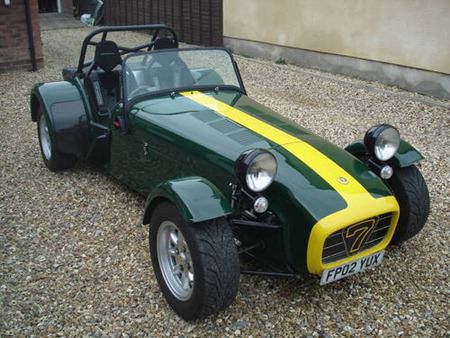There is always debate on what makes for a “classic” motor car.
A couple of years back I was approached by someone trying to work out how many classics there were down here in fun-town Pattaya. My reply was, “Not many” as you very rarely see any vehicle with classic history or pedigree sitting at the side of the road, and a quick query amongst the monthly car club natter night enthusiasts revealed that very few of them owned anything which, in my opinion, were classics. The Honda Jazz, whilst being a great little car, is hardly a classic!
 Caterham 7.
Caterham 7.
For me, a classic is a car which has had significant impact on motoring history. It is also a vehicle which has been out of production for a number of years, so that the manufacturer’s advertizing claims and slogans have been forgotten. “Safety Fast” was on all the brochures about MG cars, but when you think about it, very few were ‘fast’ and even fewer were ‘safe’.
I believe there is a tendency in countries such as Thailand to confuse ‘old’ and ‘classic’. For example, Fiat must have sold very well in the late 1950’s and early 1960’s judging by the number of battered old Fiat 1100’s that are still around. Some of these are now half a century old – but does that make them a ‘classic’?
MGB’s were a very successful mass-produced sports car that brought open-top motoring to the masses in a way that the Triumph TR series did not. So according to my definition fit into the classic category. However, what do you make of this MGB? Goes nicely, but doesn’t quite sound the part. Why? Because it has a Toyota Corolla engine in it too. Can we call this MGB/Corolla a classic? I know what I think, what do you think?
My feeling is this, if we allow this in as a classic, then we have to allow anything that looks like a classic in to the category. Bugatti T35’s built on a VW platform spring to mind immediately, but we don’t have to go that exotic. What about the thousands of 351 Cobra replicas? A 351 Cobra is most certainly a classic, but is a ‘new’ one a classic too?
Another classic that has spawned whole generations of clones is the Lotus 7, and in particular, the Super 7. An instantly recognizable vehicle which has influenced automotive design for 40 years. According to any definition, the Super 7 has to be a classic. But what about the Caterham? A newer and better Super 7 without a doubt, but it is a copy of the original design. Can we call it a classic too?
Unfortunately we haven’t got many Caterhams or Cobra replicas down here, so the debate continues but quietly. However, let me loose in a Caterham/Cobra at the Prince Bira circuit and it won’t be quietly, I can assure you!
For interest, here are some of my entries for a classic car category: 1973 Porsche RS Carrera (the forerunner of the ultimate Porsches), 1964 Mustang 289 V8 (the first of the really powerful Mustangs), 1966 Morris Cooper S (the first of the mass market pocket rockets), 1946 MG TC (first introduced sports cars for the masses to America – but ‘safety fast’?), 1958 Ferrari LM 250 (what a shape, what a noise, what a car), 1936 Cord 810 (classic Gordon Buerhig design with the coffin nose and hydraulic shifter), 1931 Mercedes SSKL (the first road car you could race and win) and the 1955 Citroen 2CV complete with canvas seats (First car made from roofing iron!).
Of course there’s lots more, but there are not too many in Thailand, I’m afraid (though there used to be a V8 Tatra in Chiang Mai).




